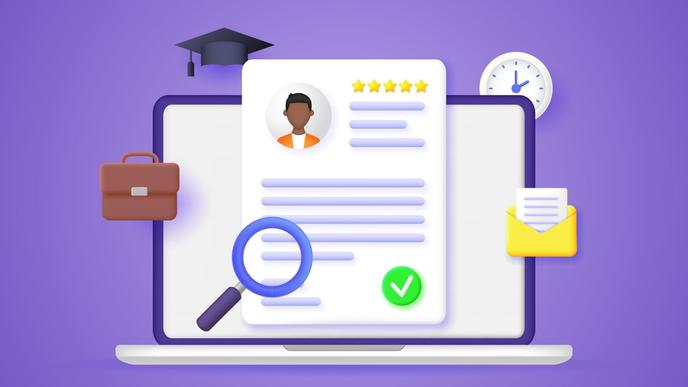How to Find a Job After a Long Break and Quickly Adapt to a New Workplace
Landing a job right after university, maternity leave, or even a career reset can be quite challenging.

This is primarily due to the ever-changing nature of business culture. For example, while a long tenure at one company used to be considered a strong point for a candidate and frequent job changes a drawback, today, the opposite is often true. People who have been out of work for extended periods still face additional difficulties. Let's explore how to increase your chances of professional success if your resume has gaps.
Why Is It Hard to Find a Job After a Break?
In addition to the fact that employers usually prefer candidates with more experience, the main challenge in the job search often becomes your own fear. A long break from professional activity can trigger feelings of insecurity about your abilities, anxiety, and confusion. There are many reasons for this:
-
Feeling like your skills have faded - Even highly experienced professionals may feel that their knowledge is no longer sufficient. However, in reality, your skills and abilities do not disappear during a long break. With just a few months of effort, you can thoroughly study the current landscape, expand your professional toolkit with a few new skills, and return to the workforce smoothly.
-
Difficulties due to lifestyle changes - This is familiar to those returning to work after a long illness or recovery period, as well as to professionals who have emigrated and are looking for work in an unfamiliar country.
-
Feeling isolated - A sense of disconnection from the professional community can arise even during a vacation. However, it's important not to give in to these anxious thoughts. A year or even two is not that long of a break, and you'll be able to catch up quickly.
-
Low self-esteem and negative past experiences - The fear of job hunting can stem from unpleasant experiences at a previous job, such as failed projects, unclosed deals, or an authoritarian boss. In such cases, there's a high risk of feeling afraid to present yourself at interviews and showcase your abilities in a new company.
It's important to understand that a long career break also has significant advantages - it is a time that can be used for self-discovery and figuring out what you truly want to do. Treat these periods as rare opportunities to rethink your career goals and life priorities. Listen to yourself - perhaps you want to change your field entirely or, on the contrary, rise to a top executive position in the company where you currently work as a junior manager.
Getting Ready to Return

Before you begin searching for a new job, it's essential to eliminate the fears caused by a long professional hiatus. First and foremost:
Step 1: Decide What You Want
This means choosing between continuing in a field where you already have experience or acquiring a new specialty. To avoid mistakes at the very first step, it's best to take several career guidance tests. These will help identify which professions suit people with your personality traits and in which industries you are most likely to succeed. Additionally, many online schools - including Lectera - run educational blogs, and we even have a full magazine! In Lectera Magazine, you'll find detailed insights into the newest and most promising digital professions.
Step 2: Update Your Knowledge and Skills
Depending on whether you've chosen to pursue a new specialization or return to your previous field, it's crucial to update your skills, fill in any knowledge gaps, and study current industry trends. Today's job market, regardless of the profession you choose, demands continuous learning, adaptation to new technologies, and ongoing improvement and expansion of your skillset. This can be done independently - for example, by reading professional literature, watching educational videos on YouTube and other platforms, following the social media of leading companies and expert bloggers, and participating in discussions on professional topics.
Additionally, online courses can help you quickly update your existing knowledge and acquire new skills. For instance, Lectera offers educational programs in digital marketing, sales, online entrepreneurship, as well as various soft skills and women's leadership. Choose the courses that match your professional interests and develop the specific competencies you need right now!
Step 3: Build Your Network
Networking refers to the ability to make valuable connections that can support your career development. It expands opportunities, helps you get useful advice and recommendations, and enables you to find potential employers, partners, investors, and more. However, successful networking is built on selfless and sincere communication, so approach it with the mindset of giving before expecting anything in return. Networking is a true investment in your future - the more useful connections you have, the more opportunities you'll gain. You can find and develop such connections at themed events like conferences, industry exhibitions, and forums, as well as in coworking spaces, training courses, and even on social media platforms like LinkedIn.
Another excellent way to grow your network is through volunteering. This is also a great way to rebuild your confidence and gain new hands-on experience. Offer your assistance to non-profits or startups. This will broaden your perspective and help you learn more about your field.
At the same time, it's important to regularly return to these three main steps - not only after career breaks. In other words, make sure that all your actions, such as changing jobs or participating in specific projects, align with your interests and values. Continue your personal development and self-improvement, and nurture your network of professional contacts - any new connection has the potential for mutually beneficial cooperation.
Full Combat Readiness: How to Write a Resume Correctly

A recruiter spends only 15-20 seconds on the initial review of a candidate's resume. Only if the resume grabs their attention immediately will they read it more carefully. That's why it's crucial to avoid the main mistakes that stand out right away.
Tip 1: Be Concise
HR managers often encounter extremes - either the candidate only lists their most recent job or submits a five-page document with a detailed biography. The optimal resume length is two pages, listing (preferably in chronological order!) the companies you've worked for, your positions there, and the skills and knowledge directly relevant to the vacancy. It's important to describe the experience and tasks you handled during your professional growth, to highlight both your strengths and weaknesses, to include concrete numbers and results your department or company achieved thanks to you - in other words, provide real case examples. What should definitely not appear in a resume are statements like which roles you're interested in or not, what responsibilities you're unwilling to take on, and so on. In such cases, the employer is unlikely to invite you to an interview. And yet it's precisely in the interview where it's more appropriate to discuss the conditions of potential future cooperation.
Tip 2: Explain the Reason for Your Career Break
A resume is the first point of contact between a job seeker and an employer. Therefore, it's important to immediately eliminate any doubts the employer might have and preemptively answer potential questions in your resume. If your employment gap exceeds three to five months, be sure to explain the reason and clarify that nothing currently prevents you from getting back to work. Also, list the advantages, new knowledge, and skills you acquired during this time. For example, if you were on maternity leave, be sure to mention that during this period you developed resilience, cognitive flexibility, time management, and responsibility. Don't forget to state that your child now attends daycare, the adjustment period has passed successfully, and you have a reliable support system including a nanny and grandparents ready to help. If you spent the last year or more continuing your education, emphasize the prestige of your training and the unique skills and knowledge you gained through it.
Tip 3: Always Attach a Cover Letter
A cover letter will in any case increase your chances of success and help the employer make a decision in your favor. So try to connect your skills with the company's requirements and expectations, prove the effectiveness of your work with facts and precise data, and suggest ways to solve challenges and improve efficiency in this specific organization. At the same time, clarify that during your break you still maintained and developed your professional skills in various aspects.
Also emphasize your interest in the job and your readiness to take on new achievements right now. This will assure the employer that you are seriously committed to returning to the professional environment. At the end of your cover letter, add a call to action to demonstrate your eagerness to return to work - for example, "I am ready to share more about my experience and the value I can bring to the company."
Most importantly, remember - employers are less concerned with how long you've worked and more with what results you've achieved, what you can do, and how you can prove it.
Work Mode: How to Prepare for and Successfully Pass a Job Interview

Step 1: Prepare for Each Interview Individually
This step involves researching the company, its history and mission, internal culture, and especially the job requirements for the position you're applying for. That's why it's important to prepare in advance for interviews at several companies. Think about and formulate a list of questions from the employer's perspective and prepare your answers in advance. Of course, you shouldn't memorize phrases word for word, but you should speak confidently and comprehensively, showing the employer your value and explaining the gap in your career. Avoid clichés and one-word answers. Also prepare questions to ask the employer - for example, how long the company has been in business, its goals for the next two to three years, your potential prospects in the position, and so on. This will demonstrate your interest in the company and help you determine whether the job is a good fit for you.
Step 2: Practice
Ask friends or family to role-play as recruiters to help you prepare. If that's not possible, practice in front of a mirror. Rehearse several different scenarios, ask questions in different orders, come up with tricky questions on the spot, and challenge yourself. This will prepare you for any situation and help you stay composed. It's best to record your monologues on video and review them afterwards. This allows you to see yourself from the outside, spot flaws and weak points, and make the necessary adjustments.
Step 3: Stay in Control
During the actual interview, it's important to stay present, avoid distractions, and stick to the answers you've practiced. Show your confidence and value as a specialist. Convince the employer that you're motivated and ready to get to work. In addition to highlighting your achievements, don't forget to mention your weaknesses. Avoid phrases like "I can't" or "I'm not good at." Instead, say that you're "currently learning," "may have difficulties with…," or "take longer to make decisions due to…" - phrasing it in a constructive way.
Don't forget about nonverbal communication during the interview. This is another reason why recording yourself on video and reviewing the footage is helpful. You may not notice that you're unconsciously crossing your arms or legs, furrowing your brows, or pressing your lips together. When speaking with an employer, try to smile slightly, maintain eye contact, use open gestures - but don't overdo it. All of this together will leave a positive impression. Also, mention your salary expectations. Don't say you have none. To evaluate the situation appropriately, study the market in advance and share the salary range you're aiming for based on your experience and skills.
Lectera’s Online Courses by topic
Back on Track: How to Adapt Quickly and Smoothly to a New Workplace
The ability to integrate quickly into a new team has become one of the most relevant and in-demand qualities in today's job market. Here are a few tips to help you minimize stress and bond with your colleagues:
Tip 1: Give Yourself Time and Avoid Sudden Moves
In a new environment, we all need time to settle in. Trust that your colleagues understand this, so don't hesitate to ask questions or seek clarification. This will only help you get into the work rhythm faster and establish effective communication within the team. Observe others, pay attention to team dynamics, and study established norms. Avoid imposing your own rules from the very first days, crossing colleagues' personal boundaries, or disrupting corporate traditions. Try to stay neutral - during informal "water cooler" chats, avoid gossiping about coworkers or management.
Tip 2: Respect Corporate Traditions and Participate in Team-Building
In large, established companies, there are usually long-standing traditions. These might include lunch outings to a nearby café, gym sessions after work, or celebratory dinners after closing major deals. You definitely shouldn't skip these events - they're among the most effective ways to help new employees adapt and foster team unity.
Tip 3: Take Initiative
Don't be afraid to share your ideas, even if they seem less than creative or original - it's always better to show interest and curiosity about the collective goal! Be ready to contribute to the company's growth, actively participate in discussions, and attend internal workshops and webinars. This will help you expand your professional network within the company, better understand various processes, and adapt more quickly to your new environment.
In fact, a long career break can become not a drawback, but a strength on your resume! The key is to demonstrate your capabilities and your willingness to conquer the world together with your new company. If you can prove your professionalism, then the total length of your employment becomes far less important. That's why Lectera recommends focusing on self-development, learning new skills, and acquiring new knowledge. We wish you success on your journey of personal growth!
Share this with your friends via:
Latest News

In the UK, £23 million has been allocated for the expansion of the EdTech Testbed program — pilots of educational technologies in schools and colleges.

In the US, Tuskegee University announced the launch of Tuskegee University Global Campus (TUGC) — a new online platform for distance learning.

A significant stage in the development of the alternative education system has begun in West Northamptonshire in the UK: the County Council is actively calling on parents, guardians, and trustees to participate in shaping the future of this key area.

Outwoods Primary School in Atherstone, Warwickshire, having experienced deep sadness after the loss of their famous cat, Silla, has found solace in a new pet – a Maine Coon named Aloysius O’Hara.

In modern universities, artificial intelligence, and in particular ChatGPT, is rapidly transforming from a controversial tool into a full-fledged student assistant.












 Spring skills audit: what to remove, strengthen, and “sow” in learning
Spring skills audit: what to remove, strengthen, and “sow” in learning
 9 Career Mistakes Young Professionals Make
9 Career Mistakes Young Professionals Make
 £23 million allocated for the expansion of EdTech Testbed in the UK
£23 million allocated for the expansion of EdTech Testbed in the UK
 Test: How Psychologically Mature Are You? Check Your Inner Foundation.
Test: How Psychologically Mature Are You? Check Your Inner Foundation.
 Test. Check Your Social Media Dependency Level!
Test. Check Your Social Media Dependency Level!
 Test: What Business is Right For You?
Test: What Business is Right For You?
